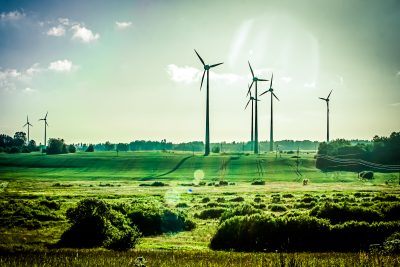Zeno’s puppy and the lumbering cart of climate change…India has the answers
Zeno knew a thing or two about global affairs: two thousand years ago the playful Greek Philosopher said the world moved forward heavily, like a fully laden cart, and we’re like a puppy tied to the rear axle. As long as we trot along behind, keeping up with the cart, it feels like we’re in control: but stop or sit down, or try to change direction, and the rope and cart jolt us forward. We’re not really in control at all. So when the world turns we have to turn with it, and that’s a lesson Prime Minister Modi must have had in mind this week when he addressed world leaders in Glasgow, at the COP 26 Conference (www.unfccc.int).
Because for two hundred and fifty years, ever since the UK first put coal and carbon at the heart of the industrial revolution, advanced economies have been endangering the future of the planet, and now they’re looking to developing economies to take up the slack. It’s the crassest form of hypocrisy, but the lumbering cart of events is already in motion, and like Zeno’s puppy we have to follow it…this isn’t a time for asking who did what and when, this is a time to slow the cart down: to change the direction of world events, and save our precious planet.
It’s to Prime Minister Modi’s great credit that he clearly understands that two thousand year old lesson.
Climate Change and Climate Finance
Climate experts this week applauded his pledge to secure zero carbon emissions by 2070, whilst at the same time (rightly) pointing out that the subcontinent’s move has also highlighted the historic obligation of developed economies to finance climate control targets. This isn’t about recrimination and soul searching, this is about real change and sustainable climate development, but India is right to call for a $1 trillion pledge from developed nations to make it happen: because climate finance is also an integral part of climate change…
And digging further into the detail, India’s commitment to achieve 500GW of renewable energy by 2030 (within nine years), more than double its current coal based capacity, will significantly transform the future shape of energy production on the subcontinent. It's a pledge that will inevitably place solar and wind generation at the heart of global change too, bearing in mind the peculiarly favourable conditions for alternative energy production across the subcontinent’s sunny uplands, and along the vastness of its meandering coastlines. On the targets announced this week, India is set to reduce carbon emissions by a billion tonnes in the next nine years, and that wasn’t even part of the contribution levels set in 2015: it represents a clear and sustainable vision for the future…and India is leading the way.
Cutting Through the Rhetoric
Small wonder then, that Prime Minister Modi also announced on Monday that India is one of only a handful of countries pledged root and branch to deliver on the “letter and spirit” of the Paris Climate Change Accords. And the Director General of the International Solar Alliance (www.isolaralliance.org), Ajay Mathur, agrees with him: “Prime Minister Modi cut through the rhetoric and delivered a big promise of climate action from India. These are enormous and transformative steps and he has made bold announcements and led from the front in Glasgow”.
They are, indeed, enormous and transformative steps, and they demonstrate the breadth and vision of India’s purpose. Tied to a lumbering cart that’s not of its own making, the subcontinent has become a key player in slowing the cart down.
Executive Summary
Prime Minister Modi’s announcement of new climate change targets has recalibrated future environmental policy: not only for the subcontinent, but clean across the planet.
Invest in Red Ribbon Asset Management

Red Ribbon is committed to identifying and building on investment opportunities that are fully in compliance with its core Planet, People, Profit policy: not only offering above market rate returns for investors but also protecting our Natural Capital.








Leave a Reply